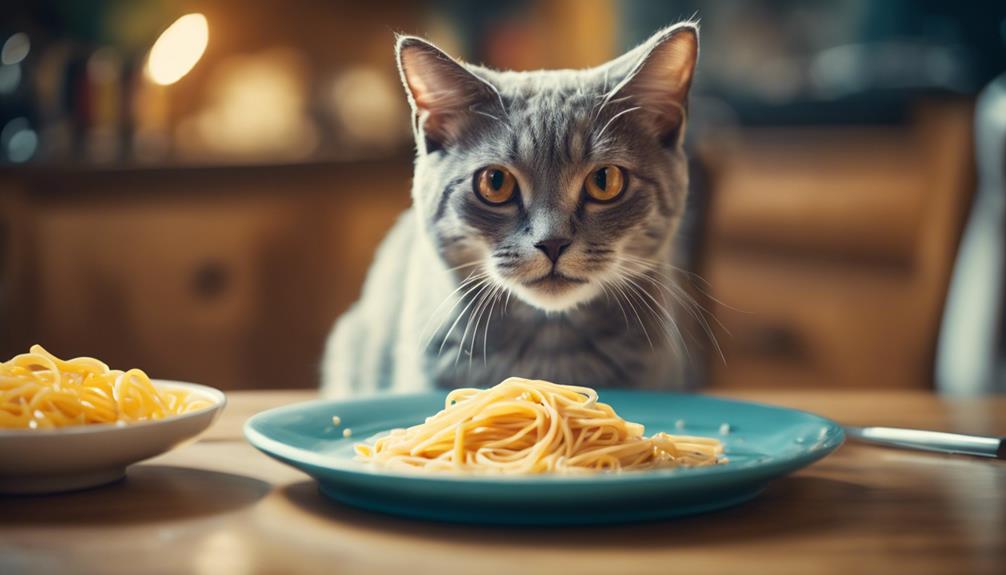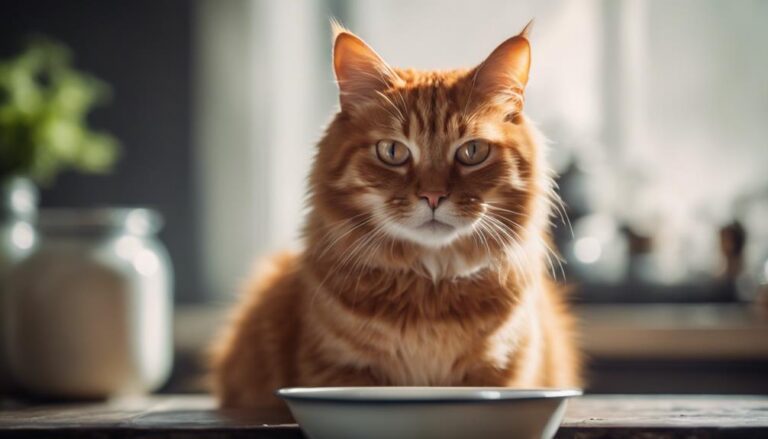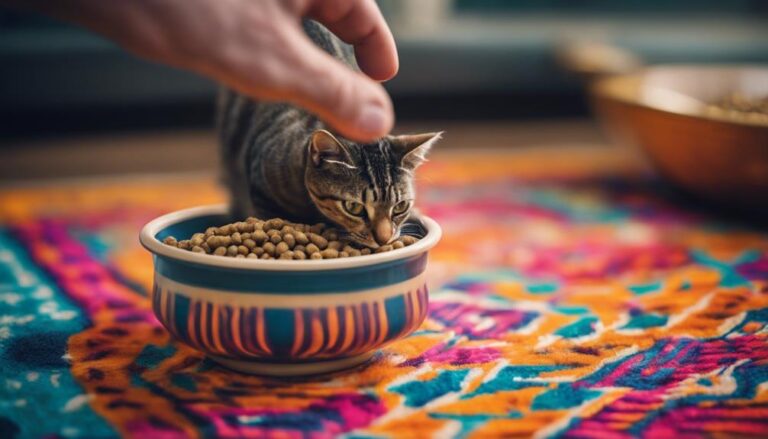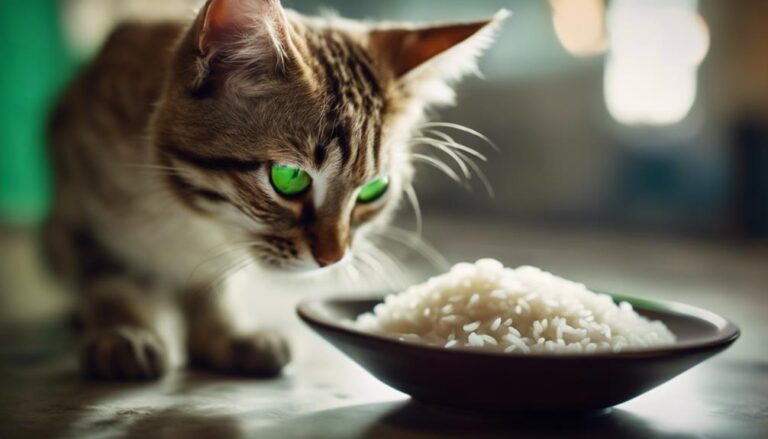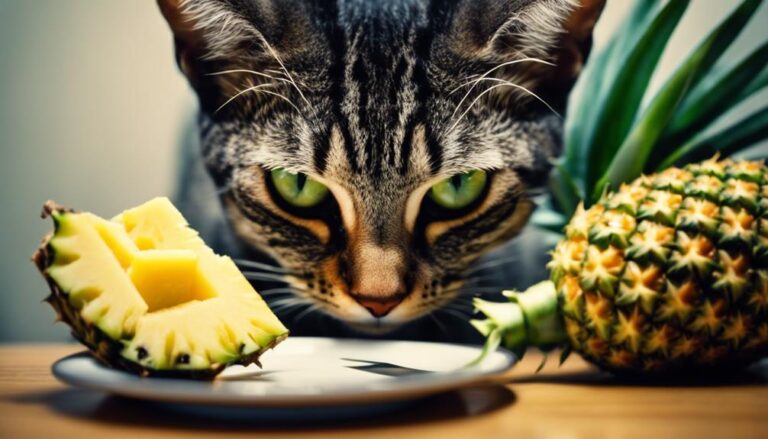If you've ever wondered if cats can eat pasta, the answer might surprise you. While cats have been known to nibble on a strand or two, the implications of a pasta-filled meal for your feline friend go beyond a simple yes or no. Understanding the nuances of feline dietary needs and the potential risks associated with pasta consumption could significantly impact your cat's well-being. So, before you decide to share your favorite Italian dish with your furry companion, it's essential to consider the facts carefully.
Risks of Feeding Pasta to Cats
Feeding pasta to cats poses significant risks to their health and well-being. While cats may nibble on small amounts of spaghetti without immediate harm, pasta isn't the best food choice for your pet. Cats have specific dietary requirements that pasta doesn't meet.
Pasta lacks essential amino acids crucial for cats' health and growth. The high carbohydrate content in pasta is unsuitable for cats, especially those under 1 year old. Consumption of pasta by kittens or nursing queens can lead to gastrointestinal issues due to their inability to digest certain components of this human food.
Unlike humans, cats require a diet rich in animal proteins for optimal health. Therefore, it's important to avoid making pasta a regular part of your cat's diet to ensure they receive the necessary nutrients for their well-being.
Safe Ways to Offer Pasta
When considering offering pasta to your cat, focus on safe ways that align with their dietary needs and overall well-being. Cooked pasta can be safe for your cat if offered in small amounts as an occasional treat.
Ensure the pasta is plain and free from ingredients like tomato, cream, garlic, or onion, which can be harmful to cats. It's important to monitor your cat's reaction to pasta and ensure it doesn't replace their balanced cat food.
Remember that pasta shouldn't be a staple in your cat's diet, but rather a supplementary treat. Before introducing pasta or any new food to your cat's diet, consult a vet to ensure it's healthy and suitable for your cat's nutritional needs.
Potential Pasta Variants for Cats
For cats, selecting plain cooked pasta is the safest option due to its lack of harmful ingredients. Cats should avoid processed pasta variants with ingredients like garlic, onion, or salt, as these can be toxic to them. Chocolate pasta is a strict no-go for cats, as it can cause illness or even death.
Creamy pasta sauces aren't suitable for cats due to their high fat and lactose content, which may upset their stomachs. To safely offer pasta to your feline friend, opt for simple and plain varieties to minimize potential health risks. Remember, cats have specific dietary needs, and it's essential to avoid any pasta variants that could harm them.
Stick to plain cooked pasta as an occasional treat, and your cat will thank you for it.
Pasta Sauces and Cat Health
When considering pasta sauces and your cat's health, it's crucial to be mindful of the ingredients used. Tomato-based sauces can lead to digestive issues, while cream-based ones are high in calories and fat.
Remember that spices like onions and garlic commonly found in sauces are toxic to cats, so offering plain pasta is the safest option.
Sauce Ingredients and Cats
To ensure your cat's health and well-being, it's crucial to be mindful of the ingredients in pasta sauces as they can have adverse effects on your feline friend.
Tomato sauce, with its high acidity, can lead to digestive issues in cats. Ingredients like garlic and onion commonly found in pasta sauces are toxic to cats and should be avoided.
Cream-based sauces, high in calories, fat, and lactose, can be harmful to most cats. Spices used in pasta sauces can also be toxic, potentially causing health issues.
It's important to steer clear of pasta sauces containing toxic herbs or seasonings to prevent any harmful reactions in your beloved pet.
Health Risks to Cats
Although some human foods can be tempting to share with your feline companion, it's important to be aware of the potential health risks posed by certain pasta sauces when it comes to your cat's well-being.
Tomato sauce isn't recommended for cats due to possible digestive issues and allergies. Cream-based sauces are high in calories, fat, and lactose, which can be harmful to most cats. Spices like garlic and onions found in pasta sauces are toxic to cats and should be avoided.
Certain herbs and seasonings in pasta sauces can also be dangerous for cats due to their low tolerance. It's crucial to ensure that cats aren't fed creamy or tomato-based pasta sauces to prevent health complications.
Moderation in Pasta Consumption
Incorporating pasta into your cat's diet should be done in moderation to prevent potential health issues. While cats can enjoy pasta as an occasional treat, it's important to remember that pasta lacks essential nutrients that are vital for their well-being. Feeding your cat small amounts of plain cooked pasta is generally safe, but it shouldn't become a regular part of their diet due to the risk of weight gain and nutritional imbalances.
To ensure that pasta consumption is safe for your feline friend, it's advisable to consult a veterinarian before introducing it into their meals. Veterinarians can provide guidance on the appropriate amount of pasta to feed your cat and help you monitor their overall nutritional intake. By offering pasta in moderation and seeking professional advice, you can treat your cat to this human food safely while prioritizing their health and well-being.
Cat-Friendly Pasta Alternatives
When considering alternatives to traditional pasta for your cat, zucchini noodles can offer a healthier option. Zucchini noodles are a cat-friendly alternative to plain pasta, providing a low-carb option that's safe for feline consumption. They can be served cooked and offer a texture that some cats might enjoy.
Remember to avoid toxic seasonings like garlic or onions when preparing zucchini noodles for your cat, as these can be harmful to their health. Just like with plain pasta, zucchini noodles should only be given to cats as an occasional treat and not as a staple in their diet.
To introduce zucchini noodles or plain pasta to your cat, consider mixing small amounts of cooked pasta with their regular cat food to add variety to their meals. Always monitor your cat's reaction to these new foods and consult with a veterinarian if you have any concerns about their diet.
Frequently Asked Questions
Can Cats Eat Cooked Pasta?
Yes, cats can eat cooked pasta in small amounts. It provides carbs, protein, and vitamins, but limit servings to prevent health issues. Avoid garlic, chocolate, or cheese in pasta. Consult a vet for any concerns about feeding your feline friend pasta.
Can Cats Eat Pasta Sauce?
Avoid feeding pasta sauce to your cat. The high acidity can upset their stomach, and ingredients like garlic or onion are toxic. Stick to cat-friendly foods to prevent digestive issues and keep your feline friend healthy.
Can Cats Eat Tuna Pasta?
Enjoying a meal together with your cat is lovely, but remember, tuna pasta isn't the best choice. While they may like it, it lacks vital nutrients. Avoid it as a regular treat to keep them healthy.
Can a Cat Eat Macaroni and Cheese?
You shouldn't feed your cat macaroni and cheese. It's high in fat and dairy, which can upset their stomach. Stick to a balanced diet for your feline friend to keep them healthy.

